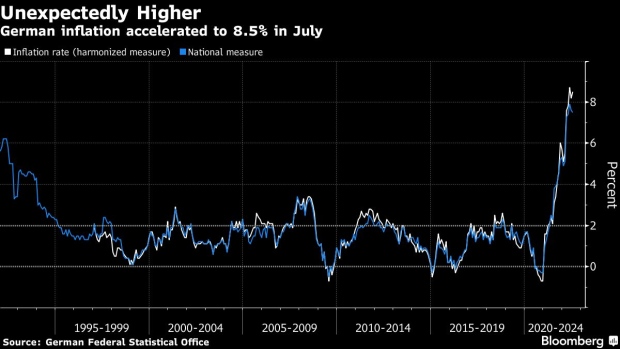Jul 28, 2022
German Inflation Unexpectedly Accelerates After Dip in June
, Bloomberg News

(Bloomberg) -- Sign up for the New Economy Daily newsletter, follow us @economics and subscribe to our podcast.
German inflation unexpectedly resumed its climb, adding urgency to the European Central Bank’s push to raise interest rates after its first hike in more than a decade last week.
Consumer prices in the continent’s biggest economy jumped 8.5% from a year ago in July after edging down to 8.2% last month as a result of temporary government-relief measures. Analysts surveyed by Bloomberg had expected a deceleration to 8.1%.
A big jump in food and energy costs drove the surprise, more than offsetting temporary fuel-tax rebates and subsidized public-transport tickets.
Record euro-zone inflation was behind this month’s half-point ECB rate increase -- double what economists had expected. President Christine Lagarde said at the time that it was important to address signs that expectations for higher prices were becoming entrenched. Some officials have since argued for further forceful moves in the future.
Beyond Germany, Italy and Spain are expected to report fresh inflation records on Friday. For the euro area as a whole, economists reckon price growth accelerated to 8.7% in July.
Thursday’s figures increase the pressure on Germany’s government as households are further squeezed. While consumers will benefit from ultra-cheap public transport through August, a possible Russian energy cutoff threatens more pain.
Finance Minister Christian Lindner, a member of the business-friendly FDP party, has so far spoken out against additional support measures -- even as his coalition partners question whether the current aid is sufficient.
(Updates with chart, inflation drivers in third paragraph.)
©2022 Bloomberg L.P.







